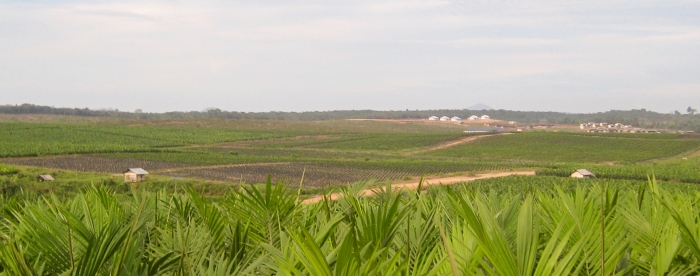In Nigeria and specifically in Cross River State, large scale land acquisition, much of it for new oil palm plantations, has strong social and environmental impacts.
To understand developments in and impacts of oil palm plantations in the Cross River State in Nigeria, Tropenbos International commissioned a series of backgrounds reviews under the framework of the Green Livelihoods Alliance. It resulted in five reviews that look at the ecological impacts in the landscape, the historical background, the political side, social impacts and the capacity gaps and needs related to oil palm plantations.
To date, much of Nigeria’s landscape has already been cleared for agriculture. Cross River State contains the richest rainforest areas in the country, where the establishment of new oil palm plantations is now the main cause of clearance. More and more estates are being planted by multinational companies along the fringes of forest reserves, exposing remaining rainforests to threats of deforestation, degradation and biodiversity loss.

Photo by: Fidelis Allen
The government wants to protect remaining rainforests and boost economic development, but in doing so, it finds itself caught between the contradictory priorities of conservation and development.
The expansion of oil palm plantations as a major driver of land grabbing, deforestation and biodiversity loss in Cross River State, is leading to serious threats to its land and people. Forest is being cleared resulting in deterioration of the environment. Local people are impoverished as they lose a major source of income, land, and socio-cultural values associated with the forest. Environmental changes also lead to impacts on health and human wellbeing. Deforestation is also expanding due to increased forest encroachment and slash and burn practices, related to new roads, improved access and escalating poverty.
A review on extant policies related to oil palm plantation in the Cross River State, revealed that there are no clear governance guidelines for the oil palm sector in Nigeria, apart from expanding production to generate more resources and emerge as a global leader in the industry. Missing links between policy, the need for investment, and the wellbeing of forest-dwelling people in the state, call for mainstreaming environment and human security issues in memorandums of understanding (MoUs) between the government and oil palm companies, as well as advocating for government to appreciate the centrality of people in the policy process.
In the midst of conflicts that surround oil palm plantations in Nigeria, CSOs and academia have been working actively to help communities bring these issues into the limelight. However, their efforts still remain rudimentary due to a significant lack of capacity and resources for advocacy purposes. There is also a clear need for more research, to identify what is sustainable land use and to provide solid data on the extent of oil palm plantations.

Photo by: Fidelis Allen
To reduce the negative impacts of oil palm plantations, the rights and welfare of people must be prioritized in the quest for economic development. As such, local communities must be recognized as stakeholders who have to be engaged in negotiations with governments and companies, and that their free, prior and informed consent is an essential prerequisite. They need to have the opportunity to make decisions regarding their own development. Environmental and human security issues between government and oil palm companies that put the welfare of local peoples centrally, must be mainstreamed, in addition to enforcing the compulsory environmental and social impact assessments that are explicitly required by law.
Furthermore, it is important that the total area of oil palm plantations in Cross River State and in Nigeria as a whole are known, as well as the trends in expansion, and their actual impacts on the forests and forest-dependent communities.
This review recommends, among other things, that NGOs, CSOs and academia establish a coalition specifically for research, advocacy and capacity building purposes. Other crucial actions that also need to be carried out, are developing a mechanism for sharing news on actions and analysis on a regular basis, and for agreeing and taking common gender- and conflict-sensitive positions, to help reduce gender inequality and avoid physical violence in the struggle to implement best practices in the large scale agricultural sector.


